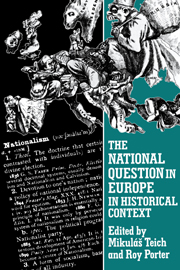Book contents
- Frontmatter
- Contents
- List of maps
- Notes on contributors
- Acknowledgements
- Introduction
- 1 The British Isles: Celt and Saxon
- 2 The making of the French nation
- 3 The national question in Italy
- 4 The roots of the national question in Spain
- 5 Shifting nationalism: Belgians, Flemings and Walloons
- 6 The nation in German history
- 7 Nationalism and nation-state in Germany
- 8 The national identity of the Austrians
- 9 The Czechs
- 10 The national question in Hungary
- 11 The union of Dalmatia with northern Croatia: a crucial question of the Croatian national integration in the nineteenth century
- 12 The national question in Poland in the twentieth century
- 13 Finland: from Napoleonic legacy to Nordic co-operation
- Index
12 - The national question in Poland in the twentieth century
Published online by Cambridge University Press: 30 November 2009
- Frontmatter
- Contents
- List of maps
- Notes on contributors
- Acknowledgements
- Introduction
- 1 The British Isles: Celt and Saxon
- 2 The making of the French nation
- 3 The national question in Italy
- 4 The roots of the national question in Spain
- 5 Shifting nationalism: Belgians, Flemings and Walloons
- 6 The nation in German history
- 7 Nationalism and nation-state in Germany
- 8 The national identity of the Austrians
- 9 The Czechs
- 10 The national question in Hungary
- 11 The union of Dalmatia with northern Croatia: a crucial question of the Croatian national integration in the nineteenth century
- 12 The national question in Poland in the twentieth century
- 13 Finland: from Napoleonic legacy to Nordic co-operation
- Index
Summary
It would be difficult to say exactly when Polish national consciousness emerged. Traces of it can already be detected in the Middle Ages, in the attitudes of inhabitants of the Polish lands to neighbouring communities speaking other languages and subject to other rulers. Conflicts with Western neighbours — with the vassals of the Holy Roman Empire of the German nation — made a particular contribution to the development of a feeling of national difference, influenced by an awareness of external threat. The literature of the Renaissance clearly testifies to the existence of such an awareness; one has only to recall the frequently cited words of Mikolaj Rej (1505–69), regarded as the father of Polish literature: ‘Let all the neighbouring nations know that Poles are not geese, but have their own language.’ Perhaps the fact that Polish kings were elected was among the reasons that a sense of loyalty to the dynasty did not develop among the politically and economically ruling nobility (szlachta); for no new dynasty arose after the Jagiellonian line died out. However, a consciousness of the unity of the nobility did appear — of a ‘nation of nobles’ — strengthened by the (not altogether justified) conviction that only in Poland was the ‘nobleman on his little plot of land the equal of the Palatine’, and that only in Poland did the nobility enjoy a ‘golden liberty’, unknown in other countries of Europe.
- Type
- Chapter
- Information
- The National Question in Europe in Historical Context , pp. 293 - 316Publisher: Cambridge University PressPrint publication year: 1993
- 7
- Cited by

